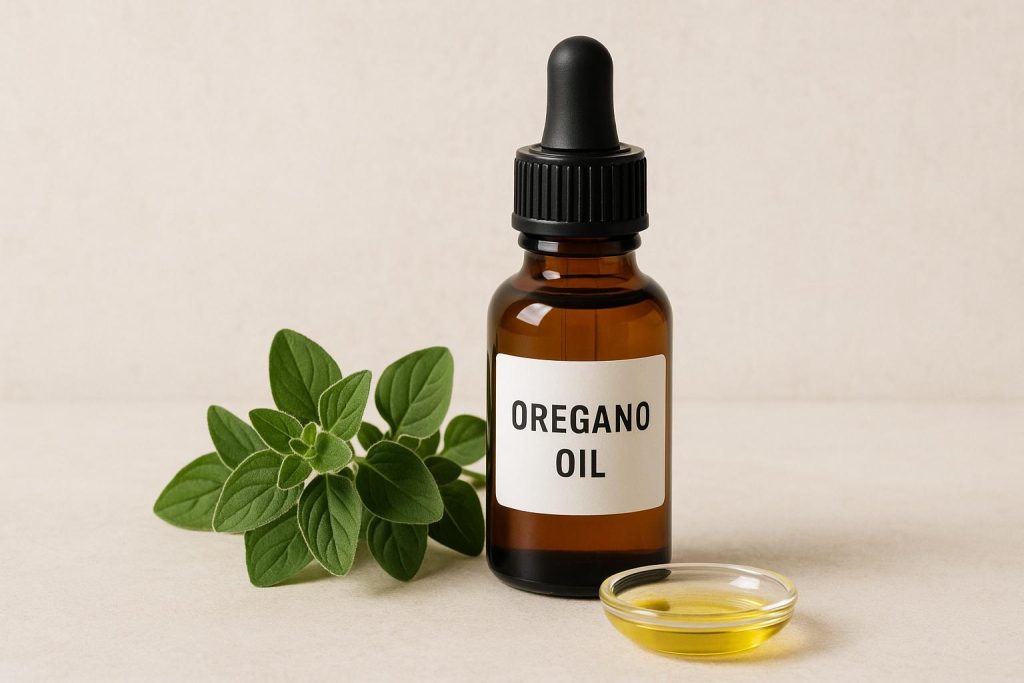
Overview of Oregano Oil
Oregano oil is an essential oil derived from the leaves and flowers of the oregano plant, known scientifically as Origanum vulgare. This perennial herb is part of the mint family and is predominantly native to the Mediterranean region. Utilized for various purposes throughout history, oregano has been revered not only in culinary applications but also in herbal medicine, where its oil in particular is esteemed for potential health benefits. The extraction of oregano oil is generally performed through steam distillation, a method that effectively captures the plant’s volatile compounds, concentrating its active ingredients.
Primary Components
The chemical composition of oregano oil includes several active compounds that contribute to its reputed bioactive properties. Among these, carvacrol and thymol stand out as the most significant. Both these compounds are frequently studied for their potential therapeutic effects.
Carvacrol has garnered attention due to its strong antibacterial and antifungal properties. This compound is believed to disrupt the integrity of bacterial cell membranes, thereby inhibiting the growth and survival of certain microbial strains. Thymol, another key component, possesses antiseptic abilities. It can contribute to the inhibition of microbial growth, making oregano oil a candidate for natural antimicrobial applications.
Potential Health Benefits
Oregano oil is under continuous scientific investigation to validate and understand its proposed health benefits. The potential areas of impact are extensive, and ongoing research seeks to further elucidate these possibilities.
1. Antimicrobial Properties: The ability of oregano oil to combat bacterial and fungal infections is one of its most acclaimed attributes. Research has pointed toward its efficacy against various bacterial strains, including those resistant to conventional antibiotics. This makes it a promising adjunct or alternative in managing infections, provided clinical efficacy is verified through comprehensive studies.
2. Anti-Inflammatory Effects: Some preliminary studies suggest that oregano oil may harbor anti-inflammatory properties, aiding in the reduction of inflammation throughout the body. This effect is potentially beneficial for individuals suffering from chronic inflammatory conditions, including certain autoimmune diseases. However, rigorous clinical trial data is necessary to confirm these effects and their implications for human health.
3. Antioxidant Activity: Rich in antioxidants, oregano oil holds the potential to aid in protecting the body’s cells from oxidative damage. Antioxidants are crucial in neutralizing free radicals, which are unstable molecules that can cause cellular damage. By mitigating oxidative stress, oregano oil might contribute to the prevention of chronic diseases such as cardiovascular disorders and certain forms of cancer.
Usage and Dosage
Oregano oil’s application is varied, and while there are several methods of use, each requires careful consideration to ensure safety and efficacy. It is vital that potential users understand the proper contexts for its application.
Topical Application: When used topically, oregano oil is usually diluted with a carrier oil, such as olive or coconut oil, to avoid skin irritation due to its potency. It can be applied to areas of skin concern, but patch testing is advisable to monitor for any allergic reactions.
Inhalation: Aromatherapy is another method through which the benefits of oregano oil might be garnered. A few drops of the oil can be added to a diffuser to promote respiratory relief through inhalation, although more empirical evidence is needed in this domain.
Ingestion: Ingesting oregano oil should be approached with caution. Given its powerful concentration of active compounds, consulting a healthcare professional before internal use is crucial. Medical guidance is necessary to determine appropriate dosages and to prevent any potential side effects or interactions with medications.
The promise of oregano oil as a natural remedy has generated interest across various fields of alternative and complementary medicine. However, further research is essential to substantiate these claims and to understand the long-term effects of oregano oil usage on human health.
Further Research and Consideration
For those interested in exploring the breadth of studies on oregano oil, there are numerous academic resources available. Institutions like PubMed and other scholarly journals provide access to a wide array of peer-reviewed research, affording a deeper dive into current findings and ongoing studies. Engaging with these resources enables an informed perspective on oregano oil’s place within both traditional uses and modern scientific discourse.
Given the preliminary nature of much of the research into oregano oil, it is recommended that individuals consider both the scientific evidence and the advice of healthcare practitioners when integrating this oil into their health regimen. By doing so, they can ensure a thoughtful and safe approach to exploring the potential benefits and applications of this noteworthy plant extract.

